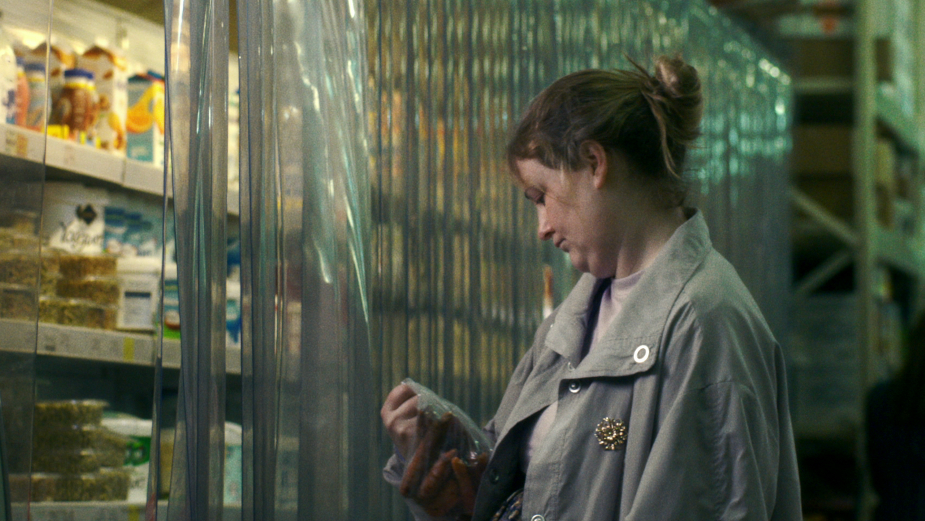
LBB Film Club: Shelf Life

“In a shallow way, I thought it would be fun,” says Luke Roulstone about the bizarre moment on which his film ‘Shelf Life’ ends. He’s speaking to an audience of friends and ad-industry colleagues in London hosted by Snapper Films, the production company that represents him for content. The audience have just had that moment imprinted on their minds, but as not to spoil it for readers who will see ‘Shelf Life’ in the future, I’ll carefully dance around it in this article.
The drive to create that climatic scene was Luke’s motivation for the 18-minute film, which has been on the festival circuit and most recently screened at the Oscar-qualifying Brussels Short Film Festival. For the film’s protagonist Dorothy, it’s a surreal culmination of a life burdened with emotional strains. Explaining what excited him about that moment, Luke says it walks the line of magical-realist weirdness that’s both funny and tinged with sadness. Everything else about the film is just to facilitate and explain that moment.
‘Shelf Life’, the film’s title, came early for Luke too. “Someone just said to me, they didn't want to buy their girlfriend flowers because they just die. And I was like, 'Hey, everything has a shelf life!’. Then I thought it could be about someone expiring. I was just sort of playing with those ideas really.”
With a firm goal in mind, the plot started to pile emotional pressure on to bring Dorothy to that dramatic ‘expiry’ moment, but it was the weight of feelings that was most important to Luke, not plot points. “It allowed me to just observe a life to some extent and allow those problems to stack up,” he says. “I'm more expressive with how I approach telling a story. I don't like to make things too plot driven; I'd rather it was more character driven.”
The characters around Dorothy are cartoonish but familiar, like the pizza delivery man that she becomes infatuated with. He’s terrible at his job but does have a moustache. And seems to think quite a lot of himself. “I wanted him to be kind of rubbish,” says Luke. “And I wanted her to be kind of sweet and someone you could fall in love with, but at the same time she’s flawed and has been held back by having to care for her mother and her brothers who are kind of oppressive and in that sort of reverse ‘Cinderlla Girl’ way. Dorothy's my favourite character. She's the main one, everyone else is kind of there to just pile on the pressure. She's become a punching bag for them.”
If the film could have been longer than 18 minutes, Luke would have liked to have made Dorothy’s mother a bit more three dimensional, he says. “But she's also there to facilitate Dorothy's struggle,” he says. “I don't think she's a nice person. But she's also there to bring an element of humour. I wanted there to be light touches.”
Dorothy’s brothers are almost one three-headed beast. “I'm one of four kids. That probably influenced it,” says Luke, explaining that he thought their dynamic was useful to pile on the misery further. “I thought there were just more people to gang up on her. I thought it would feel more difficult for her if she's got these three brothers and they're a bit of a boys club. She's the one left out and the one that has to look after the mum.”
Early on, a birthday party scene is where we meet the brothers and see their cruelty. It’s also where Dorothy begins to lose her cool, turning to comfort eating that’s both disturbing and comic. “Her eating at the buffet table is some of my favourite stuff,” says Luke. “She's feeling hurt. So her immediate reaction is just to stuff her face. I enjoy that.”
‘Shelf Life’ is set in a grey ‘90s world that Luke says was inspired by his experiences of the 2020 lockdowns, when he took solace in mainstream British TV from that time including ‘Blind Date’ and ‘Stars in Their Eyes’. “There were a lot of characters in there that I just really loved, reflecting back on that era,” he says. He also thought this setting fitted the themes of the film. “Again, playing on things that have passed their sell by date, like old dial-up internet. That gave a rough area to set it in, although it's meant to be kind of timeless.”
The location of the film is also intentionally vague. While it was shot in various parts of London over four days, the supermarket, houses and takeaway pizza shop look like they could exist anywhere in Britain at any time over the past few decades. “I'm always ideally trying to set things in kind of their own world where anything is possible, but that still feels grounded in some kind of reality,” explains Luke, further detailing the grey that ‘Shelf Life’ explores.
The realism and oddness of 'Being John Malkovich' was an inspiration, as was Christmas children’s classic ‘The Snowman’. “I didn't want anything to feel too over the top, but similarly, I enjoy things that have an element of magic to them, that feel slightly heightened reality. I'm trying to just get somewhere in the middle. I just like it to feel kind of dreamy. That's the sort of quality that I really enjoy in films. Something that sweeps me away, which is what I tried to do with the music at the beginning - to put that against uglier parts of London.”
“I'm always trying to walk the line between stuff that's strange but also funny. Tragicomedy, I suppose. I wanted to challenge myself to see if I could do something that was both funny and also a bit of a weepy, bringing this kind of sob story out of her and seeing how far we could push it.”
With so much of the film constructed around one character, casting the right Dorothy was crucial. Having seen her in the sitcom ‘Motherland’, Luke thought Philippa Dunne would be perfect. “I needed someone who you would feel empathetic towards but could also be humorous. She was the only one who really would have worked based on who we could get,” he says.
Initially, she couldn't do it because she was about to have a baby. But then she agreed to do it afterwards. “There was a moment where we didn't think we would have her and I was a bit concerned because I didn't think it would work without her. But we were lucky to get her,” says Luke.
Other challenges were perennials, such as a lack of time and resources to shoot for four days around London, often in public places. The supermarket scenes were all shot nimbly, working around the real staff and customers as they went about their days.
Then there was the climactic moment at the end, which came with its own filmmaking challenges. “That was the thing that kicked off and made me want to do something like this,” says Luke. “But it was a bit naive, I suppose. Technically, trying to pull it off in a way that was realistic was hard.”
Steven Spielberg was the main reference point for that moment. Another clue for those who haven’t seen it – it’s something he’s done in his films a few times. Luke didn't have a comparable budget for his short film. “As soon as I started asking questions in post production, we realised we needed more than our budget for that one shot. It was challenging. We kind of gave ourselves time for the day of it. We tried to go down a prosthetic route, which was new to me. I don't know if it was completely 100% successful in the way I originally imagined that, but yeah, it was good to try.”












